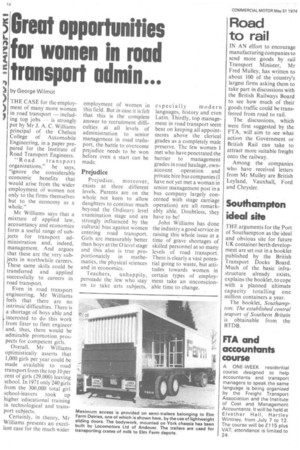Great opportunities for women in road transport admin...
Page 14

If you've noticed an error in this article please click here to report it so we can fix it.
by George Wilmot THE CASE for the employment of many more women in road transport — including top jobs -is strongly put by Mr J. A. C. Williams principal of the Chelsea College of Automobile Engineering, in a paper prepared for the Institute of Road Transport Engineers.
"Road transport organizations," he says, "ignore the considerable economic benefits that would arise from the wider employment of women not only to the firms themselves but to the economy as a whole."
Mr Williams says that a mixture of applied law, accountancy and economics form a useful range of subjects for transport administration and, indeed, management. And argues that these are the very subjects in worthwhile careers. These same skills could be transferred and applied successfully to careers in road transport.
Even in road transport engineering, Mr Williams feels that there are no intrinsiedifficulties. There is a shortage of boys able and interested to do this work from fitter to fleet engineer and, thus, there would be admirable promotion prospects for competent girls.
Overall, Mr Williams optimistically asserts that 1,000 girls per year could be made available to road transport from the top 10 per cent of girls (29,000) leaving school. In 1971 only 240 girls from the 300,000 total girl school-leavers took up higher educational training in technological and transport subjects.
Certainly, in theory, Mr Williams presents an excellent case for the much wider employment of women in this field. But in case it is felt that this is the complete answer to recruitment difficulties at all levels of administration to senior management in road transport, the battle to overcome prejudice needs to be won before even a start can be made.
Prejudice
Prejudice, moreover, exists at three different levels. Parents are on the whole not keen to allow daughters to continue much beyond the Ordinary level examination stage and are strongly influenced by the cultural bias against women entering road transport. Girls are measurably better than boys at the ()level stage and this also is true proportionately in mathematics, the physical sciences and in economics.
Teachers, unhappily, persuade the few who stay on to take arts subjects, especially modern languages, history and even Latin. Thirdly, top management in road transport seem bent on keeping all appointments above the clerical grades as a completely male preserve. The few women I met who have penetrated the barrier to management grades in road haulage, ownaccount operation and private hire bus companies (I have not yet met a woman in senior management post in a bus company largely concerned with stage carriage operation) are all remarkably able. Doubtless, they have to be!
John Williams has done the industry a good service in raising this whole issue at a time of grave shortages of skilled personnel at so many levels of road transport. There is clearly a vast potential going to waste, but attitudes towards women in certain types of employment take an unconscionable time to change.




























































































